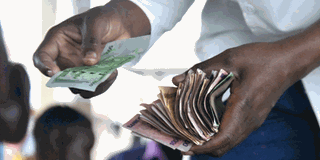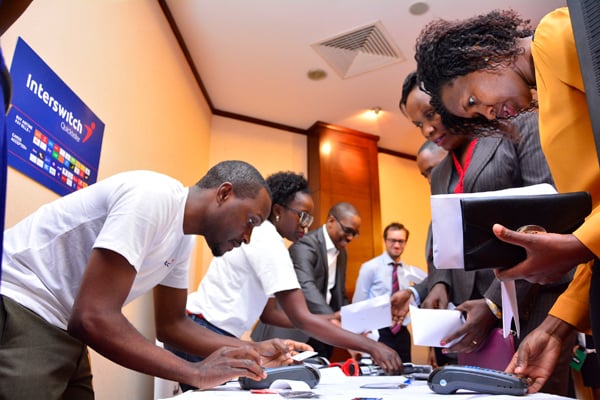Prime
Is physical money destined to disappear?

A man hands out money. Your money mindset influences how you save and spend money. PHOTO/EDGAR R.BATTE
What you need to know:
The use of cash in the economy is likely to reduce with time but it will not disappear completely.
With the emergence and growth of new money-paying technologies, many people anticipate paper money to die in the near future and usher in cashless economy.
But does that necessarily mean we are about to enter a cashless future?
According to the executive director of operations Bank of Uganda, Dr Charles Abuka, the use of cash is unlikely to go away anytime soon though it will reduce.
“The use of cash in the economy is likely to reduce with time but it will not disappear completely. In the advanced economies, 80 percent use digital means, and 20 percent in developing and least developing countries,” he said.
In the International Monetary Fund (IMF) publications finance and development titled; New Era of digital money, Dr Adrian Tobias the financial counsellor and director of the IMF’s Monetary and Capital Markets Department and Dr Tommaso Manicni, Griffoli division chief in the IMF’s Monetary and Capital Markets wrote that digital money has the potential to transform the financial sector.
They wrote that emerging markets and lower-income countries stand to gain the most from this dramatic shift. Broad and inexpensive access to digital money and phone-based transactions could open the door to financial services for 1.7 billion people without traditional bank accounts. And countries may grow increasingly connected, facilitating trade and market integration. The real-world impact is significant.
“Today, there are a billion registered mobile money accounts across 95 countries, with close to $2 billion transacted through these accounts every day. Sub-Saharan Africa is a leader in mobile money, accounting for almost half of mobile money accounts worldwide,” the report reads in apart.
It adds: “ The widespread use of mobile phones has made this possible. Digital identities, which many countries have rolled out, are another important innovation. These digital versions of passports allow mobile money providers to onboard customers at low cost while complying with local regulations.
The passage to this new world could exclude those on the other side of the digital divide. It also opens the door to fragmentation, currency substitution, and loss of policy effectiveness. The transition must be well-managed, coordinated, and soundly regulated.
The authors stated that the risk of fragmentation and a global digital divide is stark.
“Regional arrangements to settle digital money could proliferate, driven by countries’ desire for autonomy. Such arrangements could become instruments of geopolitical interests and forces, to avoid or impose bilateral sanctions and could limit currency convertibility,” they wrote.
Adding: “Yet there are also opportunities. Digital money could be leveraged to foster integration and interoperability of payment systems. New solutions must be explored, such as multilateral settlement and exchange platforms, as well as common norms or principles for the design of digital money to facilitate cross-border payments, such as remittance flows, which are essential for many lower-income countries.”
They stated that the IMF is actively working with the international community member countries and other international organizations to defend the integration of payment systems and oppose their fragmentation.
“The IMF will play a key role in the new era of digital money. The organization was created to promote international monetary cooperation and oversee the stability of the international monetary system, as well as contribute to countries’ economic and financial stability,” they wrote.
Adding: “Digital money must be regulated, designed, and provided in a way that allows countries to maintain control over monetary policy, financial conditions, capital account openness, and foreign exchange regimes. Payment systems must grow increasingly integrated, not fragmented, and must work to help all countries guard against a digital divide.They said much remains to be done, but the opportunities are immense, to the extent the risks are carefully managed.
They further pointed out: “The key to building a brighter future is cooperation—between the private and public sectors domestically and national authorities and organizations internationally. The IMF, with its near universal membership, stands ready to play its part in this momentous endeavor.”




